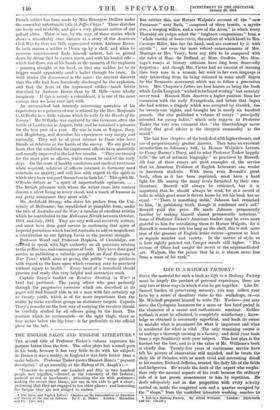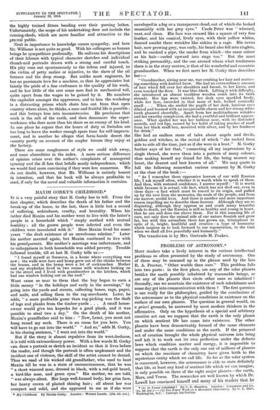LIFE IN A RAILWAY FACTORY.*
SrscE the material for such a book as Life in a Railway Factory must be largely the product of personal experience, there are only two or three ways in which it can be got together. Like Dr. Samuel Smiles, of persevering memory, you may collect your facts by a series of desultory visits to the workshops, or—as Mr. Wyckoff prepared himself to write The Workers—you may serve the Cyclopean hammers for a more or less brief period in the character of a casual and enthusiastic amateur. Neither method, it must be admitted, is completely satisfactory ; know- ledge so obtained is necessarily superficial, and leads its owner to mistake what is prominent for what is important and what is accidental for what is vital. The only remaining course is to undergo a thorough training in a factory, and distil your book from a ripe familiarity with your subject. This last plan is the hardest but the best, and to it the value of Mr. Williams's book is chiefly due. Twenty-five years of continuous service have left his powers of observation still unjaded, and he treats the daily life of Swindon with as much vivid and interesting detail as his master, Richard Jefferies, treated the daily life of the fielder and hedgerows. He avoids the fault of the expert who empha. sizes only the unusual aspects of his craft because the ordinary side of it has grown monotonous to him by repetition. He deals adequately and in due proportion with every activity carried on inside the congested acre and a quarter occupied by the " shops," from the unskilled labourers washing coaches to • Life in a Railway Factory. By Alfred Williams. London: Duckworth and CO. [5s.net.]
the highly trained fitters bending over their purring lathes. Unfortunately, the scope of his undertaking does not include the running-sheds, which are more familiar and attractive to the general public.
Next in importance to knowledge comes sympathy, and here Mr. Williams is not quite so good. With his colleagues as human beings he sympathizes profoundly. He enlivens his descriptions of their labours with typical character sketches and individual thumb-nail portraits drawn with a strong and careful touch. His pity runs out spontaneously to the infirm and injured, to the victim of petty malice or injustice, to the slave of the oil furnace and the drop stamp. But unlike most engineers, he has no passionate love for a machine, so that he appreciates but faintly the pride of a fine craftsman in the quality of his work, and he has little of the zest some men find in mechanical toil, quite apart from the wages to be gained by it. He numbers the capitalist amongst the oppressors, and to him the workshop is a distracting prison which shuts him out from that open country where alone, he thinks, a sane and fruitful life is possible ; and this betrays him into inconsistencies. He proclaims that work is the salt of the earth, and then denounces the super- workman who does more than his share as an enemy of his kind. In one place he argues that the hours of duty at Swindon are too long to leave the worker enough spare time for self-improve- ment, and in another he alleges that farm-hands desert the country partly on account of the ampler leisure they enjoy at the factory.
There are some roughnesses of style we could wish away, and some absurdities in the index. A more serious difference of opinion arises over the author's complaints of managerial tyranny and the ill fate that befalls manly independence, which we would find more convincing if they were less numerous. We do not doubt, however, that Mr. Williams is entirely honest in intention, and that his book will be always profitable to read, if only for the novel and valuable information it contains.



















































 Previous page
Previous page